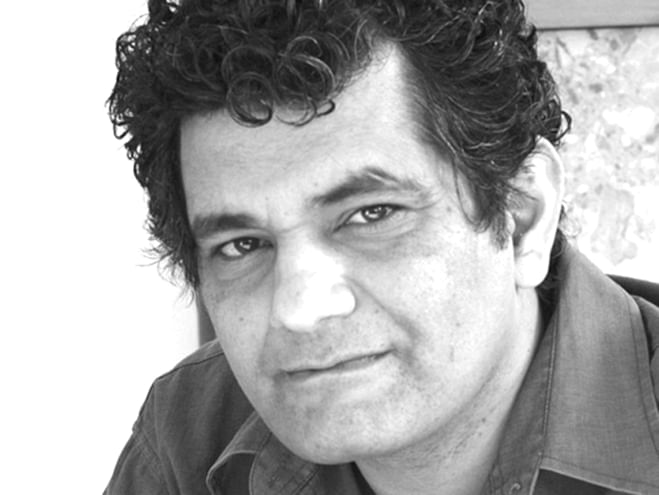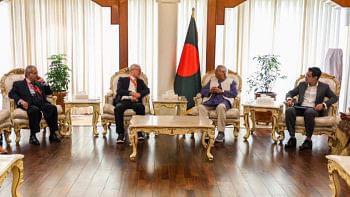A Case of Mohammad Hanif

Mohammed Hanif is a Pakistani writer and journalist. Trained at the Pakistan Air Force Academy, Hanif has an inborn talent to hit the mark with his genius writing. His debut novel A Case of Exploding Mangoes won the 2008 Shakti Bhatt First Book Prize and the 2009 Commonwealth Book Prize in the Best First Book category. The novel uses the event of Pakistani dictator Zia-ul-Haq's plane crash in 1988 as a spring-board to delve into the conspiracy theories behind it. His second novel Our Lady of Alice Bhatti, the story of a hospital nurse in Karachi, was published in 2011 and shortlisted for the 2012 Wellcome Trust Book Prize and the 2013 DSC Prize for South Asian Literature.
In this interview with the SLR editor, Mohammed Hanif talks about the mystery of babies, an occasional need to shout from rooftops and reminds Dhakaites how important it is not to take even a bit of freedom for granted.
SLR: How has your writing sensibilities been shaped by your earliest reading?
MH: There were about two and a half books in the village where I grew up. Colonel Mohammed Khan's Bajang Amad - the memoir of a Punjabi officer in Second World War - was very funny, very exotic. The second one was a collection of miracles performed by Muslim saints; fantastic. We also used to get a free government-published magazine by the Family Planning Ministry. It was quite mysterious because you never learnt how babies are made. And then there was China Pictorial everywhere. I am sure every little bit that I read influenced me.
SLR: You are both a writer and a journalist. We all know the responsibility a journalist has. Do you think you have a responsibility as a writer from Pakistan?
MH: I hope not. I mean I should try not to bore my readers or lecture them because that I can do as a journalist.
SLR: If you had to choose between the two careers, which one would you go with?
MH: Not sure. You are doing your responsible journalistic work, doing a bit of reporting or just looking at the names and ages of people killed during the last day and at some point you think it's too depressing and pointless. You rush back to that great novel that is stuck on page 18. And you spend some time with it and then want to escape back to reality. I guess I'll always choose the thing I am not doing.
SLR: One of the best scenes in A Case of Exploding Mangoes is when the generals are having their first staff meeting and they realize that Zia-ul-Huq isn't merely acting pious but is, in fact, a religious fanatic. Throughout the novel, everyone seems smarter and more sophisticated than the dictator. Do you think this 'buffoonish' syndrome is a common phenomenon in totalitarianism?
MH: I wouldn't go that far. There is a lot of buffoonery in societies which are not totalitarian. I mean, look at our own neighbourhood, look at some of our elected leaders, media personalities, tycoons. You can find quite a few. The only difference is that in dictatorships they tend to feel threatened by open laughter; in democracies like ours they encourage you to laugh. Maybe they know they are going to have the last laugh.
SLR: A Case of Exploding Mangoes was a political satire based on a real-life incident. Our Lady of Alice Bhatti is a love story about a Christian nurse who falls in love with the wrong guy. How do such diverse characters and story lines come to you? Do they percolate in you for a long time before you actually sit down to write or is it spontaneous?
MH: Nothing is spontaneous about writing a novel. An image, a voice, a fleeting memory can help you start but after that you are on your own. I am still hoping to write a spontaneous novel.
SLR: Speaking of story lines, what are you working on next?
MH: A spontaneous novel.
SLR: The genius humour is a hallmark of your work. Are you ever afraid that you'll start repeating jokes?
MH: Hahaha…that was funny. There is nothing wrong about repeating jokes. The real worry is that increasingly we live in a world where reality is so freakish, so funny, and so devastating, that a novelist might have to tame things down, make it less funny, less freakish, more livable.
SLR: Your novels are in English but you have some journalistic pieces in Urdu. Why this difference in choice of language?
MH: I like writing in Urdu. Also sometimes you feel like shouting from the rooftop and you want more people to hear. There are lots of political, historical references, poetic flourishes, clichés – lots of clichés – that only work in Urdu.
SLR: I read a beautiful piece you had written for 'Newsline' called “The Seven Places in My Heart” which recounts your original journey on the literary path. What places would you add as a sequence to that piece, now that you have travelled quite a bit more along this successful literary path?
MH: Thanks. I haven't thought about a sequel but since you mentioned it, some of the people in those seven places are dead now. Some are in and out of jails. Maybe I'll write about them.
SLR: Aspiring writers are always told that it's imperative to write every day. What's your writing regime like?
MH: I tell myself every day that I should write every day. There's no other way.
SLR: What are some noteworthy books that you have read in 2013?
MH: Goat Days by Benyamin, translated by Joseph Koyippally. Saba Imtiaz's Karachi You are Killing Me. The World in my Hands by Kazi Anis Ahmed and Sam Miller's A Strange Kind of Paradise. All rip-roaring reads.
SLR: You first visited Dhaka in 2012 for the Hay Festival, Dhaka. Is there anything you are looking forward to revisiting?
MH: I found Dhaka's bazaars and parks much safer than all the places I go to in Karachi. I mean, the traffic jams are worse than Karachi but at least I didn't think the car next to me was going to blow up. I guess, I'm looking forward to a bit of freedom.

 For all latest news, follow The Daily Star's Google News channel.
For all latest news, follow The Daily Star's Google News channel. 



Comments